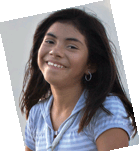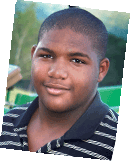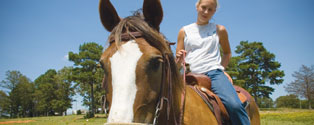Horses and Healing Go Hand and Hoof
Horses are an important part of life at the Ranch. We offer several programs that help Ranchers adjust to their new home settings. Residents are encouraged to take part in our riding program, especially in the summer months. Early morning and sunset rides over the nearly 600-acre Ranch campus in Batesville feature fields of knee high Bermuda grass and the banks of the White River where the air is cooler.
Equestrian therapy also helps Ranchers regain the ability to trust, the unfortunate result of a broken home life. Residents will strike up friendships with a particular horse and build memories that last a lifetime – memories of a friend who gave them confidence and a sense of responsibility during a time of low self-esteem and loneliness.
“It’s interesting to see which kid is drawn to which animal,” Philip Ives, superintendent at the Ranch, says. “Those who have been lied to and abandoned, they tend to seek out the trust of a horse who comes from a similar background. When the two interact during therapy sessions, that’s when the healing begins, on both ends.”
Through guided sessions on general horse grooming, one-on-one sessions with the horses and a series of tasks relating to non-verbal communication, Ranchers develop nourishing relationships that help cope with stress find meaning in fulfilling responsibilities. Teaching their equine counterpart obedience also helps them to become more self-disciplined. According Ives, the Ranchers are taught to analyze different signs and reactions made by the horse in order to translate to human behavior.
 “It’s all about positive reinforcement, Ives explains. “They learn about the balance between giving and taking, and ultimately, they begin to develop a growing sense of prudence, empathy, and trust. A child who grows up around these animals realizes a horse can be a gentle and forgiving friend who at the same time requires respect and understanding of its fragile spirit and great strength.”
“It’s all about positive reinforcement, Ives explains. “They learn about the balance between giving and taking, and ultimately, they begin to develop a growing sense of prudence, empathy, and trust. A child who grows up around these animals realizes a horse can be a gentle and forgiving friend who at the same time requires respect and understanding of its fragile spirit and great strength.”
Most Ranchers participate in the equestrian therapy program, and as Ives notes, results are beneficial from the onset through adulthood.
“At the end of the day, they [Ranchers] can lie to me and to their house parents, but they can’t fake their feelings with a horse. The horse’s attitude is very reflective of the rancher’s progress, and since the animals don’t judge them, the kids can let down their guard. During these sessions, ranchers are relieved of all social pressures.”








